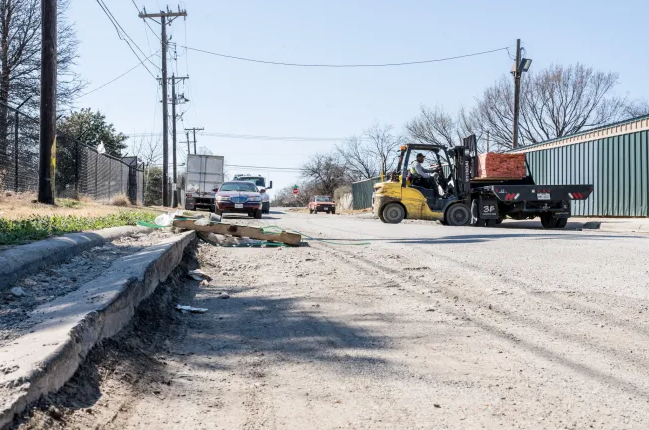Fort Worth local residents are deeply concerned about how the east side of Fort Worth is getting heavily industrialized

Fort Worth residents have waged battle against further industrial development near neighborhoods in Fort Worth east side
Fort Worth, TX – On a damp April evening within the confines of the Eugene McCray Community Center, septuagenarian Tilton Clark Sr. attended his inaugural gathering with the Echo Heights Stop Six Environmental Coalition. Although new to the group, his apprehensions pertaining to health complications induced by atmospheric contamination from trucking yards have persisted for countless years.
“The city will do whatever they want to you until they see that you’re going to fight them and you’re going to make it public, they back off,” Clark said.
Throughout the preceding year, denizens of southeast Fort Worth have fiercely opposed further industrial encroachment near residential vicinities, compelling a critical examination of Fort Worth’s 2023 Comprehensive Plan and catapulting their concerns to the forefront of a heated contest for the District 11 City Council position.
Nestled among the neighborhoods comprising the newly formed district, Echo Heights is predominantly surrounded by communities situated in the southern and eastern regions of Fort Worth. Aspiring to represent the area, candidates Ricardo Avitia, Rick Herring, Tara Maldonado-Wilson, Christopher Johnson, and Jeanette Martinez have entered the race.
Upon assuming their responsibilities, the District 11 council member will be immediately submerged in discourses surrounding Fort Worth’s comprehensive plan, a strategic framework that informs the city’s verdicts on zoning cases, budget allocations, and additional matters.
In the wake of residents’ vehement objections to anticipated industrial expansion in proximity to residential zones, the council resolved in March to postpone the adoption of the plan’s land use sections for a period of 30 days.
Owing to the impending May 6 election and a potential June runoff, council members are now anticipated to reconvene for a vote on the comprehensive plan no sooner than August 8.
Eric Fladager, Fort Worth’s Assistant Director of Planning and Data Analytics, disclosed that city staff have tentatively scheduled a community meeting for June 12, thereby affording the newly elected council member an opportunity to partake. As council members embark on a summer recess in July, sufficient time will not be available for them to appraise any modifications to the comprehensive plan prior to August, Fladager added.
Likely topics for the neighborhood assembly encompass environmental considerations, land utilization, zoning, transportation, parks, and the preservation of open spaces in southeast Fort Worth, as noted by Fladager.
“City staff anticipates providing updates to the neighborhood on work being done to help address the concerns expressed by the community at several recent meetings,” Fladager said by email. “Staff will be available to answer questions and provide additional information as requested.”
In Echo Heights, a longstanding community since 1985, residents feel increasingly disenfranchised as they face exclusion from critical decision-making processes concerning their neighborhood’s future. Letitia Wilbourn, a prominent environmental coalition leader, lamented the lack of communication between the community and city officials after a meeting in March.
Wilbourn expressed her apprehensions, suspecting that city officials are biding their time for a new representative to step in and potentially sway them to their side. She held little optimism regarding the city’s actions, asserting that their dishonesty is pervasive, thus making it challenging to trust any of their claims.
How Fort Worth east side residents have different approach to fight the unwanted development of the city in the area
On April 24th, both Herring and Avitia attended a gathering at the Eugene McCray Community Center. Avitia, a seasoned construction manager and co-founder of the grassroots organization, Hemphill No Se Vende, drew parallels between his efforts to combat gentrification in southern Fort Worth and the adversities faced by Echo Heights residents.
As an aspiring council member, Avitia pledged to ensure that communities are provided with comprehensive information regarding municipal zoning decisions and the long-term strategies for residential districts. His dedication to transparency and inclusivity aims to foster an environment in which local residents are active participants in shaping their neighborhood’s destiny.
“It’s not just one area of the city that’s going through transition. It’s the whole city, and state really,” Avitia said. “That’s the reason it’s important that we continue collaboration amongst communities.”
Possessing a background as a former zoning commissioner, Herring is well aware of the potential skepticism from coalition members who suspect that the zoning commission may have been instrumental in the proliferation of industrial facilities in the area.
Echo Heights, which houses over 180 trucking and shipping centers, waste collection sites, and warehouses, is designated as an “industrial growth center” in the city’s comprehensive plan. The city’s classification acknowledges that “residential uses are generally discouraged within” such growth centers, although it does not explicitly exclude the possibility of neighboring residential areas.
In an effort to assess his own role in shaping southeast Fort Worth’s landscape during his tenure on the commission, Herring’s campaign has filed an open records request for zoning dockets. As a long-standing neighborhood association leader, Herring maintains that he never knowingly took actions detrimental to residential communities. However, he concedes that a thorough analysis is necessary to determine the precise nature of his votes with absolute certainty.
Should Herring secure a position on the council, he is determined to establish a firm boundary to curb further industrial expansion from encroaching upon residential neighborhoods, thus safeguarding the quality of life for their inhabitants.
“It’s going to be very difficult – and I know the coalition realizes this – to turn back the clock on 60 years of zoning,” Herring said. “There are going to be some challenges, but I would just like to be able to make sure they have access to anything they need in City Hall.”
Maldonado-Wilson, Johnson and Martinez are seeking help and urge other Fort Worth residents to take action
Maldonado-Wilson, an emergency room nurse by profession, has consistently demonstrated her support for Echo Heights residents by testifying at council meetings, including the consequential March meeting that postponed the adoption of the comprehensive plan. She believes that the community and other pressing environmental concerns afflicting Fort Worth have been unjustly neglected for far too long.
As she vies for the position of district representative, Maldonado-Wilson acknowledges the heightened urgency of addressing these issues. Her tangible presence alongside the residents has resonated with the community, fostering a sense of solidarity.
Johnson, a local entrepreneur, calls for the city to accept responsibility for its contributions to industrial development and to collaborate with the Environmental Protection Agency and other organizations in devising strategies to combat pollution. He recognizes that the process will not yield immediate results but emphasizes the necessity of initiating genuine efforts to demonstrate the city’s commitment to resolving this pervasive problem. Johnson firmly believes that access to clean air should be a fundamental right for all inhabitants of these communities.
Martinez suggests that the city can immediately address residents’ concerns regarding chemical runoff from nearby truck washing facilities infiltrating their properties. She maintains that as long as an industrial enterprise does not generate pollutants, its establishment in the area should not pose a problem. Martinez underscores the value of transparent communication and advocates for the inclusion of residents in the decision-making process, rather than simply slowing down industrial growth. By fostering an open dialogue, the community’s concerns can be effectively addressed while ensuring their active participation in shaping the future.
Fort Worth east side local residents are waiting for meetings to finally take place as they fear code compliance violations
As the warm summer months approach, the Echo Heights Stop Six Environmental Coalition, a group of residents and activists, is gearing up for an action-packed season filled with pivotal events, including a council member’s election, a public meeting with city staff, and the launch of a public input campaign for the 2025 comprehensive plan by Fort Worth officials.
In a bid to develop a well-rounded comprehensive plan for 2025, the city intends to enlist the expertise of a consultant who will spearhead a city-wide public engagement initiative, encompassing both virtual and in-person meetings slated to commence later this year.
However, amid these developments, Wilbourn and her neighbors face a mounting sense of unease as they anticipate escalating tensions with the trucking companies that abut their residential properties. Since April 17, the code compliance department has embarked on six investigations into potential violations at her home and others on Tahoe Drive, as documented in the city’s database.
Concurrently, code officers have scrutinized eight complaints pertaining to businesses located in the 4800 block of Parker Henderson Road, in close proximity to Wilbourn’s residence.
Brandon Bennett, the city’s code compliance director, underscored the department’s obligation to thoroughly examine allegations on both the commercial and residential fronts. He noted that it is not uncommon for property owners, when confronted with violations, to pledge to rectify the issue while simultaneously drawing attention to other transgressions in the neighborhood.
Bennett further stated that the likelihood of such disputes dwindling is contingent upon the compatibility of different land uses, such as residential, commercial, and industrial. As discussions surrounding the 2025 comprehensive plan unfold, the potential for addressing issues that arise from zoning residential homes near industrial businesses may emerge.
During zoning commission meetings last year, developers interested in introducing new industrial businesses to the area contended that their plans were in harmony with the comprehensive plan and expressed commitment to being good neighbors.
In the aftermath of investigating complaints concerning businesses on Parker Henderson Road, Bennett’s team did not uncover any air quality or land pollution violations, as alleged by residents. However, they did identify minor code violations on both commercial and residential properties, including cleanliness and high grass issues.
All investigations pertaining to homes on Tahoe Drive were closed within a 10-minute window on April 28, as per the code compliance database. While Wilbourn is relieved that she will not be held liable for any violations, she remains apprehensive about the possibility of further allegations looming in the future.
Wilbourn expressed her dismay at the companies’ unwillingness to collaborate with the community, stating.
“It’s very chilling that these companies are not willing to come and work with the community,” Wilbourn said. “They want to act like bullies, and we were here before they were there. The community and the citizens were here before any of that was there.”
More articles can be found under the Fort Worth local news section.





